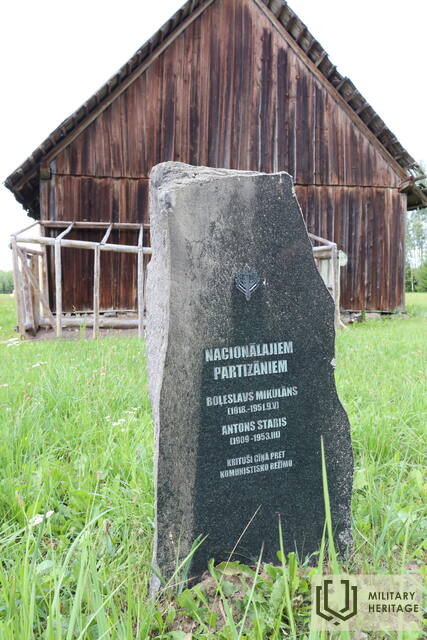Monument to national partisans B. Mikulas and A. Staris
Memorial site


 189
189



The monument to the national partisans Boleslavs Mikulāns (1918 - 1951) and Antons Staris (1909 -1953) of the Ilūkste Partisan Regiment of the Latvian Fatherland Guards (Partisans) Association was unveiled on November 1, 2003, at the “Kuršu” farm in Celminiekis, Dunava parish, at the initiative of Gunārs Blūzma, a researcher of national partisans from Sēlija.
B. Mikulāns from August 1944 was active in various national partisan groups, including the Bebrene company and the Dignāja group in 1949. In 1949/1950. B. Mikulāns, together with A. Stari, hid with Jānis Brakovka in Curonian Spit on the edge of the large forest of Bebrene Celminieki. When B. Mikulāns went to get products on May 9, 1951, he was murdered by Švarojs, an officer of the 2-N unit of the Cheka. A. Stari committed suicide in March 1953 after Curonian Spit was surrounded by Cheka officers.
On a memorial stele made of granite, next to the names of the fallen national partisans B. Mikulāns and A. Staras, the inscription is engraved: "Fallen in the fight against the communist regime."
Used sources and references:
G.Blūzma. National Partisan War in Sēlija // Resistance Movement against the Occupying Powers in Latvia. Riga: SolVita, 1997, pp. 308, 324.
The Unknown War. The Struggle of Latvian National Partisans Against the Soviet Occupiers 1944-1956. 2nd ed. Riga: Domas spaks, 2012, pp. 358-359.
https://latgaleslaiks.lv/lv/2003/11/11/16227
Related timeline
Related topics
Related stories
Selija's forest brother settlement in the Sūpe swamp
The Sūpes swamp is associated with the sites of national partisan settlements and battles, which were formed through the interaction of people and places. It is described in the ballad of the exiled Latvian writer Alberts Eglītis about the events in his native Sūpes swamp “In Moss and Mud” - a tribute to the Sūpes swamp partisans:
… “In 1945, as autumn glowed in the swamp -
On Pokļevinskis' birthday, Lieljānis shares at dinner:
Beer fermented in willows,
The Romulans worship butter,
I dry my mother's caraway bread,
Dried ham in March cuts,
And Stuchka's onions,
Ildzeniece cheese.
Rooms in resinous walls
And lightning has struck hearts,
And in eleven souls languish-
"The roots that have rotted in the ground..."
This interpretation of the past, with its post-World War II events, included human testimonies, expressions of spirit, and value systems. It recalls the popular support for the national partisans, whom the occupying power could not defeat so easily.





